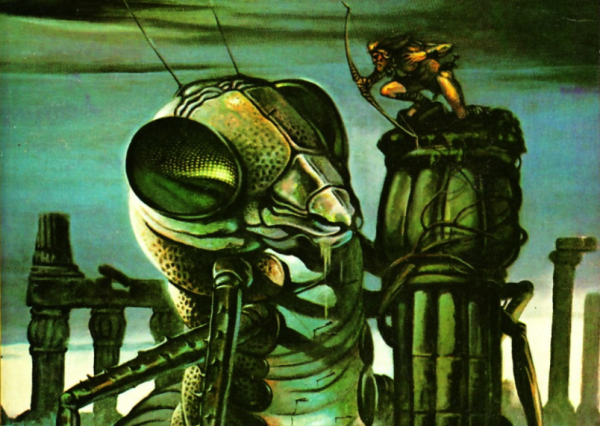
2022-11-22

Characters in our campaign killed a planar worm this month. It didn't look anything like the creature on the cover of Robert E. Howard's "The Valley of the Worm," but no worm ever has.
A while ago I was reading Dragonsfoot and a user whose thoughts I appreciate had written something like this:
The DM is also a player.
I guess this a decently common expression. An Internet search reveals that this has been said many times, many ways.
I love the simple reminder that the DM is a player because I'm a gamist DM in the extreme and I devoutly practice Roll Randomly Then Explain It (RRTEI). Sometimes I randomize a bunch and then fill in the gaps, and sometimes I do the reverse. But I always add some level of randomizaton because I don't want to be in charge. I want to be on an adventure, too. And the game will speak to you and tell you how things are, if you let it – in ways you'd never expect.
I don't want to be a god, I want to find out what the gods do. I want to play the game.
For me, the idea that the DM is a player of a game is incompatible with rule-zero gameplay, gameplay where the DM regularly overrides rules and dice with personal whims. I'd end sessions with a feeling of dissatisfaction if I put DM fiat before the rules of the game. Wins don't feel as good when you cheat, and it's no different for D&D. If I've overruled the rules or the dice to create a desired outcome, it just spoils the whole thing. The "win" of a having a good session is just manufactured if you, well, manufactured it.
Now, on DMG p. 110, Gary writes:
In many situations it is correct and fun to have the players dice such things as melee hits or saving throws. However, it is your right to control the dice at any time and to roll dice for the players. You might wish to do this to keep them from knowing some specific fact. You also might wish to give them an edge in finding a particular clue, e.g. a secret door that leads to a complex of monsters and treasures that will be especially entertaining. You do have every right to overrule the dice at any time if there is a particular course of events that you would like to have occur.
If you stop reading there, you might get a different idea than if you finish the paragraph:
In making such a decision you should never seriously harm the party or a non-player character with your actions. “ALWAYS GIVE A MONSTER AN EVEN BREAK!”
The idea is clear. If you guide the game in any way, it should be toward excellent gameplay – more action, more drama, more adventure – and not to tip scales. It is my opinion that even in that case, this tool should be used rarely.
That's the dice. What about the rules?
Anthony Huso's already said it. That post has everything you need to know. But here's some more:
When I sit down at the table, I'm not thinking about running a show. I'm not an entertainer. You say the DM's an entertainer and I don't buy it. The game entertains. Because it's fucking good. (Good delivery helps, though.)
When we kick off a session, I have a smile on my face because I'm about to play a game with other players, and we're going on an adventure in which I never know what will happen, and can often scarcely believe what happened when the night's over. Every night, it's just so cool how the pieces rise and fall.
If you follow the rules, the spirit of the rules, and much of the wisdom found in the AD&D rulebooks, you will be able to produce a satisfying game. And – you will have the foundation to improve at the game, because the game's rules are a structure which you and the other players can gain skill with, rules you can rely on.
If you're anything like me, the magic that can happen when you play the game is so much more real than events you manufacture by breaking the rules. When you run the rules, follow the procedures, and respect the dice and then magic comes out, that's the good shit. And when I have to make a ruling, I always ask the other players if they agree – do they accept the proposed odds? Often they do, and sometimes they don't and we adjust.
I might be the master of the dungeon, but I'm not master of the game. I'm a player of the game, and at the end of the night when the other players are saying things like, "I can't believe that happened!" and "I can't believe we lived!", I'm right there with them because I didn't do it, I didn't make it happen, the game did. No dice brushed aside, no rules broken.
If you've mostly played in rulings-before-rules groups, any time is a great time to see how the other side lives. "Old-school" doesn't always mean "rulings before rules," despite what some people say. There's a different way to engage with RPGs, and it has to do with that third letter. All you need is a game system with enough structure to give you a strong foundation for a lasting, meaningful campaign. I've heard original Advanced Dungeons & Dragons is pretty good.